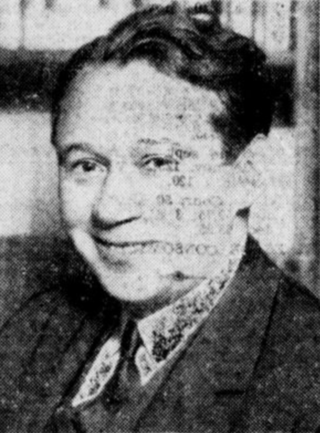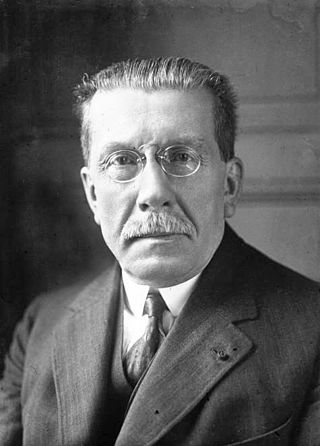
Aristide Pierre Henri Briand was a French statesman who served eleven terms as Prime Minister of France during the French Third Republic. He is mainly remembered for his focus on international issues and reconciliation politics during the interwar period (1918–1939).

Pierre Jean Marie Laval was a French politician. He served as Prime Minister of France three times: 1931–1932 and 1935–1936 during the Third Republic, and 1942–1944 overseeing the German occupation of France during World War II. After the war, Laval was tried as a collaborator and executed for treason.

André Pierre Gabriel Amédée Tardieu was three times Prime Minister of France and a dominant figure of French political life in 1929–1932. He was a moderate conservative with a strong intellectual reputation, but became a weak prime minister at the start of the worldwide Great Depression.

Pierre Paul Henri Gaston Doumergue was a French politician of the Third Republic. He served as President of France from 1924 to 1931, succeeding Alexandre Millerand, who had resigned.

Théodore Steeg was a lawyer and professor of philosophy who became Prime Minister of France.
Events from the year 1921 in France.

Marmande is a commune in the Lot-et-Garonne département in south-western France.

The King's Camelots, officially the National Federation of the King's Camelots was a far-right youth organization of the French militant royalist and integralist movement Action Française active from 1908 to 1936. It is best known for taking part in many right-wing demonstrations in France in the 1920s and 1930s.
The Independent Radicals were a centrist or conservative-liberal political current during the French Third Republic. It was slightly to the right of the more famous Radical-Socialist Party, and shared much of its historical radicalism. The prominent political scientist André Siegfried described them as "Social [that is, economic] conservatives who did not want to break with the Left, and who therefore voted with the Right on [economic] interests, and with the Left on political issues".

Raoul Adolphe Péret was a French lawyer and politician.
Events from the year 1929 in France.

Georges Suarez, was a French writer, essayist, journalist, and jurist. Initially a pacifist during the rise of Nazi Germany, he later became a right-wing journalist and collaborator. He had been editor of Aujourd'hui, a French newspaper controlled by the Third Reich after the resignation of the writer Henri Jeanson. Suarez was also the biographer of Philippe Pétain, and other figures of the French Third Republic. He was the first journalist sentenced to death during the Épuration légale.

Henry Bérenger was a French writer and politician who was an influential Senator from 1912 until 1945, sitting on committees on Finance and Foreign Affairs. He was France's ambassador to the United States from 1926 to 1927.

Henry Frédéric Chéron was a French lawyer and politician who became active in local politics in the Calvados department of Normandy while still a young man, and always maintained his roots in Normandy. He was elected to the Chamber of Deputies and then to the Senate, and held various ministerial posts between 1913 and 1934. He generally held moderately conservative views, believed in fiscal responsibility and balanced budgets, and felt strongly that agriculture was the foundation of France's prosperity.

Georges Edouard Félix Bonnefous was a French progressive Republican politician who was deputy for Seine-et-Oise from 1910 to 1936. He was Minister of Commerce and Industry from 11 November 1928 to 3 November 1929 in the governments of Raymond Poincaré and Aristide Briand.

René Henry Besnard was a French politician who was a deputy for Indre-et-Loire from 1906 to 1919 and senator from 1920 to 1941. He was briefly Minister of the Colonies and then Minister of Labor and Social Welfare in 1913. He was twice Undersecretary of State for War during World War I (1914–18), and did much to reform aircraft production. He was briefly Minister of Colonies in 1917. From 1924 to 1928 Besnard was Ambassador of France to Rome. For a few days in 1930 he was Minister of War.

Pierre Forgeot was a French lawyer, politician and businessman who was involved in issues of war damages during and after World War I (1914–18). He was Minister of Public Works in 1928–29. After leaving politics in 1936, he was administrator of the French arm of Hispano-Suiza, the automobile and armaments manufacturer.

Louis Marie Joseph Etienne Rollin was a French politician who was a minister in several cabinets in the period between the two world wars.

Jean-Baptiste Morel was a French politician who was twice Minister of the Colonies in the period immediately before World War I (1914–18). During the war he led an influential committee on economic warfare.
















